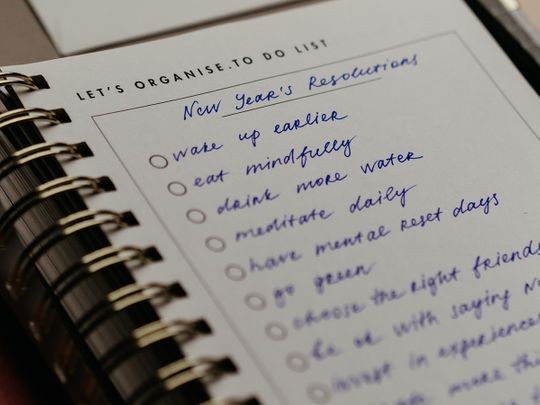
We’re already three days into 2023 – how difficult or easy are you finding it to stick to your New Year’s resolutions?
Click start to play today’s Spell It to figure out how to ‘slay’ all your goals for the year ahead.
With solemn and challenging resolutions often taking up the top spots on our lists – from losing 20kg in weight, to quitting smoking to learning a whole new language – the path to our goal can get tiresome and tedious as the months progress. But behavioural scientists have discovered a host of techniques to boost our chances of sticking to our new objectives.
Here are a few science-based tips that you can apply to your goals this year:
1. Follow a cue-based plan
Cues tell Broadway stars when to step onto the stage. You can use a similar format when planning your resolutions – don’t just state what you’re going to do, make sure you mention where and when you’ll follow through. A 1999 study published in the journal American Psychologist found that adding a cue to your plan helps you remember when to act. For instance, perhaps your New Year resolution is to meditate three days a week. Your cue-based plan would state that you’ll meditate at the office on weekdays during your lunch break – so you now have a clear idea of how to execute your goal. Try it out this year!
2. Add a penalty clause
To add some accountability to your objectives, you could give yourself a penalty if you don’t achieve your resolution. According to a January 1 report in US-based news website CNN Health, one way people can do this is by telling a few people about their goals, so that they feel ashamed if they are asked why they haven’t followed through. A steeper penalty could be cold, hard cash! An October 2010 study in the journal American Economic Review found that self-imposed cash penalties motivated success when people tried to quit smoking. Such penalties have long been known to be even more motivating than rewards.
3. Make it fun
Always focusing on being efficient can leave you feeling fatigued and even bored. If it’s not fun to exercise or study, you’re unlikely to keep at it all year round. An April 2016 study in the UK-based Journal of Consumer Research found that people persisted towards a goal for longer when elements of pleasure were introduced to the routine. One way to do this is by ‘temptation bundling’, according to the CNN report – combine a chore with a guilty pleasure, to make it more fun. For instance, only let yourself watch your favourite TV show at the gym, or only let yourself drink your favourite mocha latte during a study session – it’ll help you look forward to working out or studying.
Do you use any of these strategies to achieve your New Year’s resolutions? Play today’s Spell It and tell us at games@gulfnews.com.







